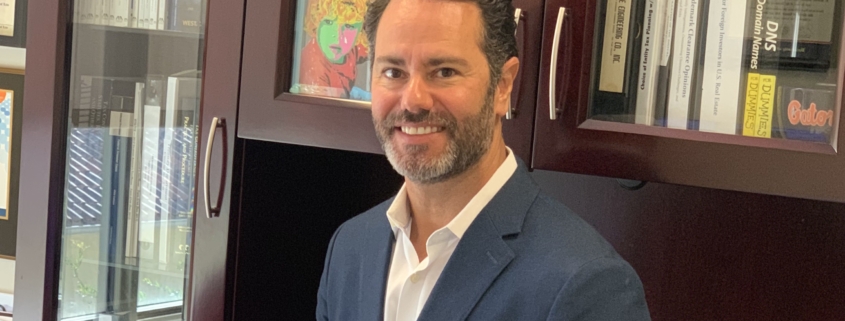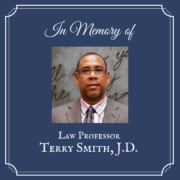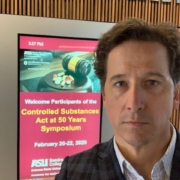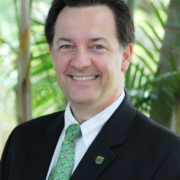LAW SCHOOL TO CAREER: MY JOB AS AN EQUITY PARTNER
At St. Thomas University, we are committed to our students’ success inside and outside of the classroom. Our Law School to Career series will feature and celebrate STU Law alumni and job experiences. Get to know STU Law alumnus, Ricardo “Rick” Arce, and his job experience as an Equity Partner at Zumpano Castro, LLC.
1. Name: Ricardo “Rick” Arce
2. J.D./ LL.M/ Concentration/ Certificates:
J.D., St. Thomas University School of Law
LL.M., University of Miami School of Law, Taxation, Certificate in International Taxation
3. Graduation Year:
2008 J.D. (I was class 2009, but I finished early)
2010 LL.M.
4. Where do your work, and what is your title?
Zumpano Castro, LLC, Coral Gables. Equity Partner
5. Did you always know you would be pursuing this line of work?
No, I worked as a financial advisor with Morgan Stanley before deciding to go to law school. After the Internet bubble burst in 2000 and the collapse of Enron, among others, I decided to change direction and pursue a legal career. The Enron scandal and all of the other corporate governance scandals that ensued, such as Tyco and Worldcom, motivated me initially towards a career in securities law. In fact, I purchased one share of Enron stock (it cost me more to get the certificate than what the stock was worth) and hung on my wall as motivation. Alas, circumstances change, student loan debt accrues, and so I decided to focus on tax law to engage in M&A (mergers and acquisitions) and cross-border transactions.
After law school and practicing commercial litigation for over a year, I obtained an LL.M. in taxation and, after that, began working for a boutique firm in downtown Miami. However, this was shortly after the “great recession” and M&A activity had substantially decreased. I wasn’t doing the M&A deals that I had envisioned, and I missed the excitement of arguing before the Court. So, I returned to the firm with whom I did my first internship, and began shifting my practice more towards complex business litigation. When I started law school, I didn’t think I wanted to be a litigator because of the perceived stress of the job, but as it turns out, the positive pressure of litigation is what drives me.
See my bio at https://www.zumpanocastro.com/ricardo-arce
6. What does a day at work look like?
When I am at the office, I am either developing case management strategies, conducting in-person or telephone conferences with clients or opposing counsel, or drafting or assessing court documents. When I am out of the office, I usually advocate for a client before the Court, conducting a deposition, attending mediation, or other client-related activity. Things have changed in light of the pandemic, so I still regularly conduct the same activities, albeit now virtually through Zoom. Generally, I spend most of my day facing adversity and trying to figure out ways of overcoming such adversity—a pretty typical day of a litigator.
7. What’s your favorite part about your job?
I love overcoming challenges. I rarely, if ever, have a case where the facts are perfectly laid out for me. Most of the time, even when the law and facts are generally on our side on the substance of the case, we face challenges, whether jurisdictional, evidentiary or a combination of factual challenges that can potentially affect the outcome. Overcoming those challenges can be very rewarding. However, nothing is more rewarding than obtaining a good result for clients who express their appreciation for the hard work and zealous advocacy we provide to our clients.
8. What challenges have you faced, and how have you overcome them?
Challenges are a daily reality and should be embraced. Overcoming those challenges is the value we provide clients as attorneys, among other things. In dealing with challenges, I always take the approach that there’s always a solution. However, equally important is recognizing that I don’t make the facts or the law pertaining to the case, therefore managing client’s expectations and properly aligning those expectations to the realities of the case can be helpful, from a client management perspective, when the potential solutions are less than ideal. To that end, I try to spot potential challenges early on in a case so we can find ready solutions (usually there are various solutions, some better than others) to minimize any adverse consequences, or in some cases, properly manage the client’s expectations.
Nonetheless, as a litigator, I passionately fight for my clients to overcome all obstacles, even in cases where the odds are stacked against us. A tool I learned from Professor Pertnoy in Florida Civil Practice, which I still employ today to help me manage difficult cases: “If the facts are against you, argue the law. If the law is against you, argue the facts. If the law and the facts are against you, argue procedure.”
9. How does your job connect back to your coursework and extracurricular activities at STU?
STU law school trains students to conduct critical and analytical thinking of problems and issues. STU law helped me learn and refine those skills, which I put into practice every day. I had great experiences with all of my classes, but some in particular, have proven to be vital to my practice, such as Contracts I and II with Prof. Singer, Florida Practice with Prof. Pertnoy, Appellate Advocacy with Prof. Musto and Trial Advocacy with Prof. Russomanno. Although law school can be a demanding and stressful endeavor, looking back now, I only have fond memories of my experiences at STU. I will always have that bond with those classmates with whom I “fought in the trenches” studying for exams, developing outlines, and preparing for the Bar exam.
10. What advice do you have for Bobcats that are interested in following in your career footsteps?
Stay focused on the prize. Everyone learns differently, therefore, develop a daily study plan that works for you. Surround yourself with students that share your same goals and study habits. Prepare your own outline over the course of a semester for each class.
I found it extremely helpful to have an evolving outline for each class. After every class, I would input my notes from that day into my respective class outline with the key points discussed during the lecture. You reinforce the learning process by inputting your notes into your outline and by reviewing it frequently. Studying for finals begins on the first day of class. You will be less overwhelmed and better prepared to go into the exams by maintaining and regularly reviewing your outline throughout the semester. I remember during orientation, a professor said to the audience, “you can’t continue with the study habits that got you through undergrad and expect to succeed in law school.” This is true, and why developing an outline throughout the semester was vital for me.
Seek help when you need it. In my experience, STU professors were always available to help and answer questions outside of the classroom. Also, time management is paramount. Law school will seemingly occupy all of your time, but its important to manage stress by working out, staying healthy, and taking occasional breaks to recharge your battery. Law school is a marathon, not a sprint, so pace yourself.
It is also important to take summer internships. It’s one thing to study the law; it is entirely another to practice the law. There are so many aspects of being a lawyer that law school won’t teach you. Gaining the experience of a summer internship will help solidify your understanding of the law, how it is put into practice, and make you more marketable when the time comes to find a job.
11. Describe your job in a GIF?
This is the “new normal” during COVID-19 (click image below)
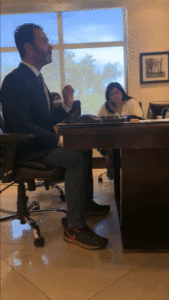
12. Anything you would like to add that we did not cover?
Attending law school at STU was one of the best decisions of my life. It brought me such intellectual enrichment, confidence, and purpose. It’s been 12 years since I graduated from STU law, and I have not once regretted the decision to change my career to become a lawyer. The legal profession is an honorable and respectable way to earn a living. However, always remember that zealously advocating for your clients and conducting yourself ethically and professionally are not mutually exclusive. Take pride in your work product and especially your reputation in the community, “it takes many good deeds to build a good reputation, and only one bad one to lose it.” – Benjamin Franklin.
Learn more about how STU Law’s Career Development can help you find the right internship or job for you! If you’re interested in sharing your internship or job experience with STU News? Reach out to Yamile Rodriguez at yamilerodriguez@stu.edu.

